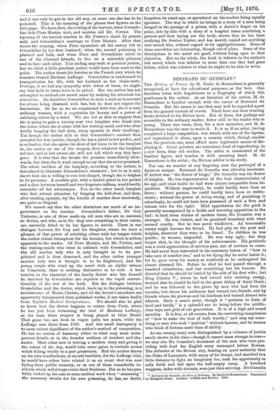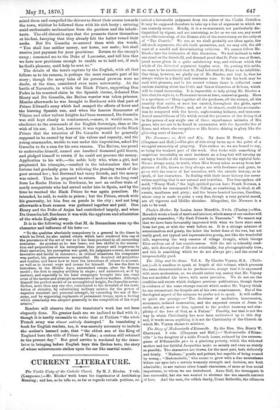BERTRAND DU GUESCLIN.*
THE Ilistory of France by M. Ernie de Bonnechose is generally recognized, at least for educational purposes, as the best. One therefore turns with hopefulness to a biography of 'which this gentleman is the author. As an historian of his nation, M. de Bonnechose is familiar enough with the career of Bertrand du Guesclin. But his career is one that may well be regarded apart from the general current of events. There have not been wanting books devoted to the Breton hero. But of these, few perhaps are accessible to the ordinary reader; fewer still to the reader who is young. There was room, then, for a new narrative, and M. de Bonnechose was the man to make it. It is as if an artist, having completed a large composition, was struck with one of the figures, and reproduced it alone, upon a canvass which, though smaller than the previous one, must afford more legitimate means of dis- playing it. Great painters are sometimes fond of reproducing, in a new form, their old studies. The artist is enamoured of the familiar figure, and touches it with caressing hand. M. de Bonnechose is the artist ; the Breton soldier is his study.
Nor can we wonder at any lingering over the portrayal of a figure so unique. Bertrand du Guesclin was chivalry incarnate. If Arthur was "the flower of kings," Du Guesclin was the flower of knights. He was representative of the best characteristics of his age, and what faults he had were almost inseparable from his qualities. Without impetuosity, he could hardly have been so brave ; without passion, he could hardly have been so enthu- siastic; without the power of hating wrong, and of punishing it relentlessly, he could not have been possessed of such a firm and intense love for the right. Mild approbation for the good is generally accompanied by a feeble and wavering opposition to the bad : to both these virtues of modern times, Du Guesclin was a stranger. He was violent, and he punished treachery with what seemed cruelty. But he was never vindictive. An honourable enemy might become his friend. He had pity on the poor and helpless, wherever they were to be found. To children he was gentle ; to women, respectful. He was very ugly ; but they forgot that, in the thought of his achievements. His gratitude was a vivid appreciation of services past, not of services to come. He had never been instructed in the necessary lesson of "how to take care of number one," and to his dying day he never learnt it ; for he gave away his money as recklessly as he endangered his almost charmed life. Before he died he had passed through a hundred vicissitudes, and lost everything but his honour. He directed that he should be buried by the side of his first wife; but King Charles V., whom he had served with untiring energy, decreed that he should be laid in the great Abbey of Saint Denis; and he was followed to the grave by men who had been his enemies, but whom his nobleness had turned into friends, and by friends whom his prowess and his kindness had turned almost into adorers. Such a man's story, though it "pertains to feats of broil and battle," is a splendid one to bring before the middle- class boys and girls of our generation. It is of a high and sound morality. It is free, at all events, from the enervating compromise of "how to make the best of both worlds ;" and may say some- thing to men who seek "position" without honour, and to women who think of fortune more than of ability.
As one among many acts distinguished by a calmness of justice rarely shown in his time—though it cannot seem strange in oars— we may cite Du Guesclin's treatment of the men who were pro- viding with food the English army encamped before Rennes. The defender of the Breton city, hearing on good authority that the Duke of Lancaster, with many of his troops, had marched to a little distance to fight an imaginary foe, took the opportunity to sally forth and fall upon the half-empty camp. A hundred waggons, laden with victuals, were just then arriving. Du Guesclin • Bertrand du Gaudin, Me Hero of Brittany. 13y Emile de Bonaechose. Tranalated by Margaret Jeune. London: Griffith and Farran. 1665.
seized them and compelled the drivers to direct their course towards the town, whither he followed them with his rich booty ; entering amid enthusiastic acclamations from the garrison and the inhabi- tants. The old chronicle says that the peasants threw themselves at his feet, fancying that they already felt the halter round their necks. But Du Guesclin re-assured them with the words, "You shall lose neither money, nor horse, nor mule ; but shall receive just payment for your provisions. Return to the enemy's camp ; commend me to the Duke of Lancaster, and tell him that we have now provisions enough to enable us to hold out, if such be God's pleasure, until help be sent us."
The details of the hero's capture by the English, with all that follows as to his ransom, is perhaps the most romantic part of his story ; though the many tales of his personal prowess were no -doubt, at the time, considered even more noteworthy. At the battle of Navaretto, in which the Black Prince, supporting Don Pedro in his renewed claim to the Spanish throne, defeated Don Henry and Du Guesclin, the Breton warrior was taken prisoner.
Months afterwards he was brought to Bordeaux with that part of Prince Edward's army which had escaped the effects of fever and the burning Spanish sun, and when the famous Stammerer of Vilaine and other valiant knights had been ransomed, Du Guesclin was still kept closely in confinement,—more, it would seem, in obedience to the commands of the English Sovereign, than at the wish of his son. At last, however, it was represented to the Black Prince that the retention of Du Guesclin would be generally supposed to be caused by fear of his valour and capacity, and the young commander, unable to rest under this imputation, asked Dtt Guesclin to fix a sum for his own ransom. The Breton, too proud to undervalue himself, named one hundred thousand gold francs, and pledged himself to return if he could not procure the money.
Application to his wife,—the noble lady who, when a girl, had prophesied his triumphs,—resulted in the information that her fortune had gradually gone in relieving the pressing wants of the poor around her ; but Bertrand had many friends, and the money was raised. Then he prepared to return. But on the long road from La Roche Darien to Bordeaux, he met an endless train of needy compatriots who had served under him in Spain, and by the time-he reached the Black Prince he was again penniless. He intended, he said, to reside in prison ; but the Prince, struck with his generosity, let him free on parole in the city ; and not long afterwards afresh ransom was gathered together and paid. Don Henry and the Duke of Anjou had contributed largely, and when Du Guesclin left Bordeaux it was with the applause and admiration of the whole Englisharmy.
It-is in the following words that M. de Bounechoae sums up the obarsrcter and influence of his hero
To the qualities absolutely compulsory in a general in the times in which he lived, he also united others which have rendered him one of the precursors of the art of war as it has been practised in all succeeding centuries. As prudent as ho was bravo, not less skilful in the concep- tion and preparation of his enterprises than prompt and impetuous in their execution, his perception was quick. his judgment correct, his mind inventive and fertile in resources ; in critical situations his composure was perfect, his perseverance unequalled. He despised old prejudices and routine, and knew how to turn the inventions of others to account, as wallas to invent ways and means for himself. He was the first to introduce, in the Middle Ages, entrenched camps, after the Roman model; the first to employ artillery in sieges ; and understood, as if by instinct, and especially in his later campaigns brought into use, some even of the tactics and strategic movements of modern warfare. Although himself the perfect model of an accomplished knight, Du Guesclin never- theless, more than any one else, contributed to the downfall of the insti- tution of chivalry, by substituting military science for the power of superior numbers and personal strength, by extending the use of fire- arms, and by organizing regiments of permanent troops, upon a footing which eventually was adopted generally in the composition of the royal armies."
Readers will observe that the translator's work has not been
elegantly done. No greater fault are we inclined to find with it ; though it is hardly excusable to write that at Poitiers "the whole Prencli army was almost entirely destroyed." In translating a
book for English readers, too, it was scarcely necessary to include the author's learned mote, that "the eldest son of the King of England bore the title of Prince of Wales ; a custom still retained in the present day." But good service is rendered by the trans- lator in bringing before -English boys this Breton hero, the story of -whose achievements strikes upon the ear like martial music.































 Previous page
Previous page